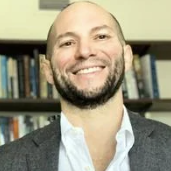Generative AI is rapidly changing the landscape of higher education and instructors are navigating what that means for the classroom. This year, the Institute for Teaching, Innovation, and Inclusive Pedagogy (TIIP) launched the Co-Intelligence Exploration Teaching Fellowship to give instructors across Rutgers University-New Brunswick a space to explore these technologies together.
The fellowship invited instructors to experiment with generative AI in thoughtful, student-centered ways. Over the course of the year, they tested new ideas, shared feedback, and developed course activities that blend technology with deeper learning. What emerged were honest conversations and a shared sense of curiosity about what’s possible.
That curiosity was often the starting point. For some, joining the fellowship was about staying ahead of the curve. For others, it was about reimagining what effective, ethical teaching looks like in a changing world.

“I was inspired to participate in the Co-Intelligence Exploration Teaching Fellowship because I saw a need to reframe how we approach generative AI in the classroom—not as a threat to academic integrity, but as a tool to foster deeper learning, creativity, and critical thinking. As someone who integrates active learning and student-centered pedagogy into large psychology courses, I was intrigued by the potential of AI to support—not replace—human insight and intellectual exploration. The fellowship has helped me think more deliberately about how to teach with AI rather than just around it…For example, I’ll have them prompt ChatGPT to explain a psychological concept and then identify where it’s incomplete or biased. This approach empowers students to think more critically about both AI and their own understanding.”

“As an educator committed to innovation and inclusivity, I wanted to better understand how these tools could support student learning while ensuring thoughtful and responsible implementation. Learning alongside other fellows has been incredibly rewarding. I see generative AI not just as a tool for efficiency but as a partner in inquiry—one that can help students develop critical thinking, improve writing and study strategies, and explore content in new ways. It’s also made me more intentional about teaching students how to use AI responsibly, including how to question its outputs, integrate it into their learning workflows, and understand its limitations. The fellowship has helped me shift from a cautious curiosity to a more confident, creative engagement with AI in my courses.”
Once they joined the fellowship, instructors began rethinking how AI could show up in their classrooms as a tool for deeper engagement. The activities they developed were as varied as their disciplines: some used AI to spark reflection, simulate real-world problem-solving, and many found other creative ways to build critical thinking into the process.

“I have been using ChatGPT4.o and a commercial product, Packback, which has AI integrated into it to understand student motivation and writing skills. I have also found myself exploring smaller kinds of lessons based on the course and found the students engaged and surprised. They are curious and they need permission to explore without the threat of violating the honors code. Much learning can happen while using GenAI in a thoughtful and directed way.”

“The project is doing an ethical critique on a book of their choosing. Students are grouped together based on the ethical issue their books cover and they must present about it and create discussion questions and/or case studies to discuss with the class during their presentation…For my first activity using AI, it was important for me to talk to my students about AI prompting to ensure some AI literacy. Students practiced their prompting after reading their books and discussing the ethical issue at hand with their group mates and finessed their prompts based on the output.”
As the fellowship progressed, many of the fellows began thinking more deeply about what intentional use of AI actually looks like in their own disciplines. Rather than focusing solely on the tools themselves, the emphasis shifted toward how AI could support the deeper skills each field is built on.

“Overall, I think the way one incorporates AI into a classroom should be based on the discipline and learning outcomes of the class. One thing in Political Science that we stress is critical thinking and writing skills developed over long periods of time as a life and career skill, and I think our use of the engines in our current discipline should be used to help facilitate those skills while still giving them a foundational grasp of the fundamentals. Overall, I see a strong pathway for my own classes to blend experiential learning and AI-based assessments to help blend “’the new and the old’” together for enhancing their education.”
What unites these fellows isn’t just their use of generative AI, but their commitment to student-centered teaching. Across disciplines, they’re all working to build practices that make space for both innovation and integrity.
On May 2, 2025, we’ll hear from three fellows as they share how they’ve brought this work into their classrooms. Their projects span marketing, agriculture, and environmental science but the common thread is a desire to use these tools in ways that are intentional and grounded in real learning.
We invite you to join the conversation and reflect on how AI might support your own teaching practice. Additional fellows will present at the 2025 Active Learning Symposium and continue the exchange of ideas that this fellowship was designed to spark.
